Platycercini
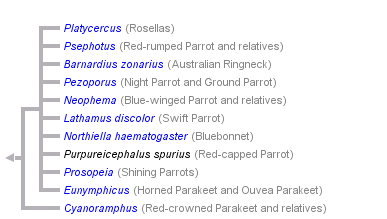


This tree diagram shows the relationships between several groups of organisms.
The root of the current tree connects the organisms featured in this tree to their containing group and the rest of the Tree of Life. The basal branching point in the tree represents the ancestor of the other groups in the tree. This ancestor diversified over time into several descendent subgroups, which are represented as internal nodes and terminal taxa to the right.

You can click on the root to travel down the Tree of Life all the way to the root of all Life, and you can click on the names of descendent subgroups to travel up the Tree of Life all the way to individual species.
For more information on ToL tree formatting, please see Interpreting the Tree or Classification. To learn more about phylogenetic trees, please visit our Phylogenetic Biology pages.
close boxReferences
Boon, W-M, O. Robinet, N. Rawlence, V. Bretagnolle, J.A. Norman, L.Christidis & G.K.Chambers. 2008. Morphological, behavioural and genetic differentiation within the Horned parakeet (Eunymphicus cornutus) and its affinities to Cyanoramphus and Prosopeia. Emu 108:251-260.
de Kloet, R. S. and S. R. de Kloet. 2005. The evolution of the spindlin gene in birds: Sequence analysis of an intron of the spindlin W and Z gene reveals four major divisions of the Psittaciformes. Molecular Phylogenetics and Evolution 36:706-721.
Title Illustrations

| Scientific Name | Barnardius zonarius barnardi |
|---|---|
| Location | Cocoparra National Park (near Griffith), NSW, Australia |
| Specimen Condition | Live Specimen |
| Source | Australian Ringneck (Barnardius zonarius) |
| Source Collection | Flickr |
| Image Use |
 This media file is licensed under the Creative Commons Attribution-NonCommercial License - Version 2.0. This media file is licensed under the Creative Commons Attribution-NonCommercial License - Version 2.0.
|
| Copyright | © 2008 David Cook Wildlife Photography |
| Scientific Name | Platycercus elegans |
|---|---|
| Location | Canberra, ACT, Australia |
| Specimen Condition | Live Specimen |
| Source | Crimson Rosella |
| Source Collection | Flickr |
| Image Use |
 This media file is licensed under the Creative Commons Attribution-NonCommercial License - Version 2.0. This media file is licensed under the Creative Commons Attribution-NonCommercial License - Version 2.0.
|
| Copyright | © 2006 Julian Robinson |
| Scientific Name | Platycercus eximius |
|---|---|
| Location | captive at Woodland Park Zoo |
| Specimen Condition | Live Specimen |
| Source | Eastern Rosella - (Platycercus eximius) |
| Source Collection | Flickr |
| Image Use |
 This media file is licensed under the Creative Commons Attribution-NonCommercial-NoDerivs License - Version 2.0. This media file is licensed under the Creative Commons Attribution-NonCommercial-NoDerivs License - Version 2.0.
|
| Copyright | © 2006 Lilbenne |
About This Page
Page copyright © 2009
 Page: Tree of Life
Platycercini.
The TEXT of this page is licensed under the
Creative Commons Attribution-NonCommercial License - Version 3.0. Note that images and other media
featured on this page are each governed by their own license, and they may or may not be available
for reuse. Click on an image or a media link to access the media data window, which provides the
relevant licensing information. For the general terms and conditions of ToL material reuse and
redistribution, please see the Tree of Life Copyright
Policies.
Page: Tree of Life
Platycercini.
The TEXT of this page is licensed under the
Creative Commons Attribution-NonCommercial License - Version 3.0. Note that images and other media
featured on this page are each governed by their own license, and they may or may not be available
for reuse. Click on an image or a media link to access the media data window, which provides the
relevant licensing information. For the general terms and conditions of ToL material reuse and
redistribution, please see the Tree of Life Copyright
Policies.
- First online 31 August 2007
- Content changed 11 February 2009
Citing this page:
Tree of Life Web Project. 2009. Platycercini. Version 11 February 2009 (temporary). http://tolweb.org/Platycercini/103323/2009.02.11 in The Tree of Life Web Project, http://tolweb.org/




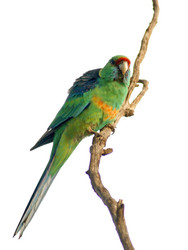
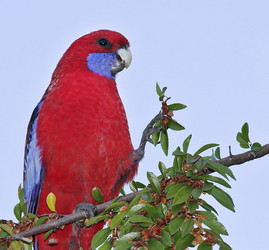
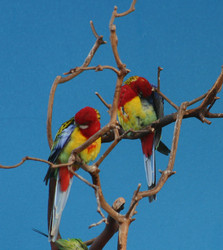

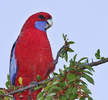


 Go to quick links
Go to quick search
Go to navigation for this section of the ToL site
Go to detailed links for the ToL site
Go to quick links
Go to quick search
Go to navigation for this section of the ToL site
Go to detailed links for the ToL site